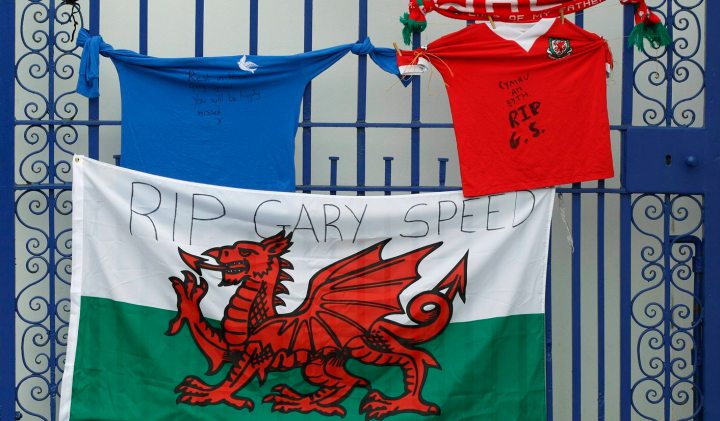Sport
Depression’s grip on the beautiful game

Since the release of Football’s Suicide Secret, a documentary which delves into the issues of depression and mental health problems in soccer, the PFA chairman, Clarke Carlisle, has been inundated with calls for help. Some countries have been fairly progressive in their approach, but there is a great need for action across the board. By ANTOINETTE MULLER.
Babak Rafati, a German referee, was due to officiate a Bundesliga fixture in 2011. He never showed up and the match had to be abandoned. He was later found in a bath tub with his wrists slit. After being rushed to hospital and treated, he confirmed that he was suffering from depression and that he would opt for psychological care. He added that he would like to return to officiating, but later announced in April last year that he’d retired.
Clarke Carlisle was 21 when he was playing for Queens Park Rangers and England’s under 21-side. He had it all. He suffered an injury which set back his progress, and ended up trying to take his own life. He survived and went on to a 16-year career of ups and downs. He’s currently the Chairman of the Professional Footballers’ Association and in a recently screened documentary called Football’s Suicide Secret, laid bare the mental health problems he battled for so many years.
Since the release of the film, Carlisle has been flooded with requests for help from 30 players, with five of them in the top flight. The most troubling call came from a 13-year-old boy who was training at a top club’s academy.
Injury, loss and retirement all play a part in the mental well-being of players. Mood shifts happen quickly and can sometimes be brought on even through a challenging training session or a manager who simply does not understand.
“Parts of being a footballer are incredibly glamorous – the amounts of money, the success. But there are ups and downs that happen very quickly, even with a training session,” Carlisle said.
The film also features an insert on Gary Speed, the Welsh player and manager who took his own life in 2011. His wife, speaking about it for the first time, said that she had no clue that her husband was ill. She still battles with not having been able to help him, or simply not being able to tell him that everything would be all right.
That is a recurring theme in so many cases of depression. The great mask, the best acting and not wanting anyone to know that there might be a crack in your veneer. Equally important is understanding what exactly is wrong when feelings of listlessness and being overwhelmed come to the fore.
Carlisle has had his fair share of dealing with players not knowing what is wrong with them and seeking an escape away from what they’re feeling and away from the game itself.
“I will categorically state there are hundreds of players suffering with this,” he said.
“The numbers in society are one in four and footballers are members of that society. The thing about football is that the reluctance to come forward and speak means there are so many guys sitting under the radar.
“As PFA chairman, I’ve had 15-20 guys come to me and say, ‘Clarke, there’s something wrong with me and I don’t know what it is or where I should go’. All they know is they want to be out of football, out of the system. And those are just the ones who had my number and felt they could call. You cannot undersell this.”
The problem is equally prevalent amongst referees, as Rafati’s case highlights. Former Premier League referee Mark Halsey has spoken out about the need to help referees deal with the pressures of the job. The 52-year-old retired at the end of last season, but wants action for officials.
“It will not be long before a referee has a nervous breakdown,” he said.
“I also believe that if we do not do something to help referees with mental health and stress issues, then we could see a suicide.”
Mental health issues have become a massive talking point in recent years, but there’s still a while to go before it is accepted as simply being an illness like any other. But the importance of talking about depression publicly cannot be understated. The more the illness is discussed and viewed as just that – an illness – the more lives will be saved. Highlighting the issues by having public figures, particularly those of one of the most watched sports, speak about it is just one step towards removing the stigma.
Robert Enke was a successful footballer who took his own life in 2009. His tragic death led to the establishment of the Robert Enke foundation which deals primarily with the mental health of players. The German federation now ensures that every club provides psychiatric treatment to players. There is a 24-hour helpline for those who want to reach out. His death might have been a tragedy, but his legacy lives on. It is imperative that these systems are put in place across the world, especially in countries where the stigma surrounding depression is still associated with being weak or, even worse, possessed by outwardly spirits.
The need for everyone across the board to act is vital. Germany have been progressive in their approach, but even in England, where an association exists to help players, there have been issues. Former Norwich striker, Leon McKenzie, tried to kill himself and despite contacting the PFA, he was never given an “understanding response”. Lee Hendrie also overdosed twice and didn’t feel like he could talk to anyone. How sad that somebody seemingly surrounded by support felt like they had nowhere to turn.
Suicide is the biggest killer of young men of 18 to 35 in England. The majority of those can almost certainly be prevented, and simply creating awareness might be the first step towards doing so. DM
Photo: Tributes to Wales manager Gary Speed hang on a gate outside Cardiff City’s stadium in Cardiff, November 28, 2011. Gary Speed, the manager of the Wales national team, was found dead on Sunday at the age of 42, the Football Association of Wales (FAW) said in a statement on Sunday. REUTERS/Phil Noble




















 Become an Insider
Become an Insider